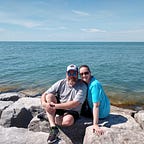3 Questions to Help You Fight Fear
If I’m honest, there are a lot of things that frighten me. As a child, I went through the usual cycle of fears: fear of being left alone progressed to fear of the dark at night which progressed to fear (or, what I now know as social anxiety) of being around people and trying to relate to them at school.
In elementary school, although I didn’t realize it at the time, I was abused by a first-grade teacher who, for no discernable reason, would pick on me, make fun of me in group settings, and walk by and hit me with a ruler while I was doing my work.
In grade nine, at the start of high school, I was placed in a grade ten homeroom because I had done some early-placement math classes. An announcement was made early in the year for all grade nine students to report to the auditorium for an orientation.. I knew my teacher was a little hard, so I was reluctant to ask. But the student sitting next to me kept telling me I should go to the orientation, so I raised my hand and asked to go, only for the teacher to embarrass me in front of the whole class by asking me which grade my homeroom class was in.
Is it any wonder I had deep social anxiety in classroom settings even into my graduate school years?
I’ve also experienced fear in my workplaces. Most of my work has been in a church setting. I’ve experienced fear around whether people would like me and my preaching style; whether leaders would be responsive to my ideas; and how to function in meetings when it was clear the other leaders met without me and made several decisions already, making the meeting, and my input, a formality.
Fear can often be paralyzing! I also have an irrational fear of snakes. I love to go hiking with my kids when my family goes camping, but it is a challenge to look ahead and at the scenery around us instead of at my feet, watching for snakes!
I’ve also felt the paralyzation of fear in leadership meetings in my work settings. I’ve struggled with presenting my own thoughts and ideas, knowing that one or more leaders were just going to strike them down because they weren’t their ideas, or, worse, because they just didn’t like me. I’ve taught lessons where I knew some were taking notes, looking for a reason to accuse me of something.
At its root, fear signals the absence of control. We fear what we cannot control.
- We cannot see what is happening around us when it is dark.
- We could not have foreseen the snake that pops out from underneath some leaves!
- We don’t know what has already been decided in a meeting when we walk in with new, bold ideas.
In saying that fear signals something to us about the absence of control, I’m making a neutral judgment about fear. Fear is neither good nor bad; it can be both/and; and it can just be.
This morning, I read Psalm 46 in my Bible. It begins this way:
God is our refuge and strength,
always ready to help in times of trouble.
So we will not fear when earthquakes come
and the mountains crumble into the sea.
Let the oceans roar and foam.
Let the mountains tremble as the waters surge!
Interlude
Obviously, you will note the word “fear” in this reading. The simple meaning of this psalm is that God will be, or ought to be, at least, one’s refuge and strength. Because God is a refuge who offers help in times of trouble, there is no reason to fear. Let trouble come! God will protect and help; there is no need for fear.
What really struck me on my read-through, though, was the italicized portion in the New Living Translation: “Interlude.” Normally, in Psalms, this word simply describes a musical notation or an instruction to the director of music. But in my reading, the word brought the substance of the previous verses together and made a statement about fear.
In this reading, the way to overcome fear is to trust something else, to have something that is your anchor that will keep you steady. For Bible readers, this anchor is God.
But what is this anchor for you?
Consider the word “interlude.” As I said, I was struck by this word as a way for me to pause and reflect, to take a literal interlude, and to think. I asked myself these questions:
- What am I fearing?
- What am I trusting?
- How do I build a bridge to trust that overcomes fear?
If you have fear in your life, I encourage you to do this same exercise. Take an interlude in your day, maybe a walk or a coffee break, where you can get away by yourself and think. Then ask yourself those same questions: what are you fearing?; what are you trusting?; and how can you build a bridge to trust that overcomes fear?
Fear is irrational and based on what we can’t control. I’m not suggesting we can completely control fear, but we can harness a positive response and reaction when we’re fearful.
— — — — —
Join my Daily Discipleship community and receive a free prayer guide, 7 Days to More Effective Prayer.
